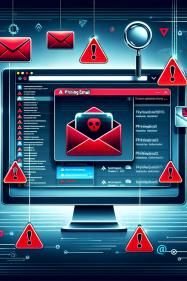Phishing is a well-known cyber threat that uses deception to steal sensitive information. However, phishing comes in various forms, each exploiting different communication channels. Smishing and phishing are two commonly used tactics. While they share similar goals, they use different methods to deceive victims. At Arsen, we focus on empowering employees with the knowledge to identify and combat these attacks. In this article, we’ll explore the smishing and phishing meaning, the different types of phishing attacks and how to defend against both.
What is Phishing?
Phishing is a cyberattack where attackers impersonate trusted entities, such as banks, online services, or employers, to trick individuals into sharing sensitive information. These attacks typically arrive in the form of emails, luring victims to click on malicious links or provide personal information.
How It Works
Phishing emails often use deceptive techniques, like urgency ("Your account has been compromised!"), to pressure recipients into clicking on fake links or downloading harmful attachments. These links usually lead to counterfeit websites designed to capture usernames, passwords, or financial details.
Defense Strategies
- Inspect URLs: Always hover over links in emails to reveal the true destination. Avoid clicking on links that seem suspicious or unfamiliar.
- Use Email Filters: Email filtering tools can block many phishing emails before they reach your inbox, reducing the risk of accidental clicks.
What is Smishing?
Smishing (SMS phishing) is a form of phishing that targets victims through text messages (SMS). Cybercriminals send fraudulent messages that mimic legitimate companies or services, often urging the recipient to take immediate action.
How It Works
A smishing message may inform you of a problem with your bank account, an unrecognized transaction, or an enticing prize. The message typically contains a link to a fraudulent website or a phone number that connects you to the scammer. By clicking the link or responding to the message, you risk exposing personal information or downloading malware onto your device.
Defense Strategies
- Avoid Clicking on Links: Be wary of links in unsolicited text messages. If a message claims to be from a company, contact them directly using verified contact details to confirm the message's authenticity.
- Use Mobile Security Apps: Install security apps on your mobile device that can detect and block smishing attempts.
Smishing vs Phishing: Key Differences
While smishing and phishing have the same goal—stealing your information—their main difference lies in the communication method used.
Phishing primarily targets individuals through email, taking advantage of the volume of emails people receive daily. These attacks often involve elaborate techniques, such as creating fake websites that resemble legitimate ones.
Smishing uses text messages (SMS) to reach victims. Since people tend to trust SMS more than email, smishing often capitalizes on urgency, like warnings of account suspension or offers of limited-time deals, to elicit a quick response.
How to Protect Against Both
Enable Two-Factor Authentication (2FA): Whether through phishing or smishing, attackers often seek login credentials. 2FA adds an extra layer of security, preventing unauthorized access even if credentials are stolen.
Be Skeptical of Unsolicited Communications: Whether you receive an unexpected email or text message, approach it with caution. Verify requests through official channels before taking any action.
Educate Employees: Training is crucial. At Arsen, we offer next-generation awareness programs that simulate phishing and smishing scenarios to help employees recognize and respond to these attacks.
Conclusion
Both smishing and phishing are dangerous tactics used by cybercriminals to steal sensitive information. While phishing typically targets individuals through email, smishing uses text messages to deceive victims. Understanding the differences between these tactics and employing specific defenses, such as avoiding suspicious links and using security software, is key to protecting your information.
At Arsen, we provide comprehensive training to help employees recognize and defend against phishing and smishing attacks.

